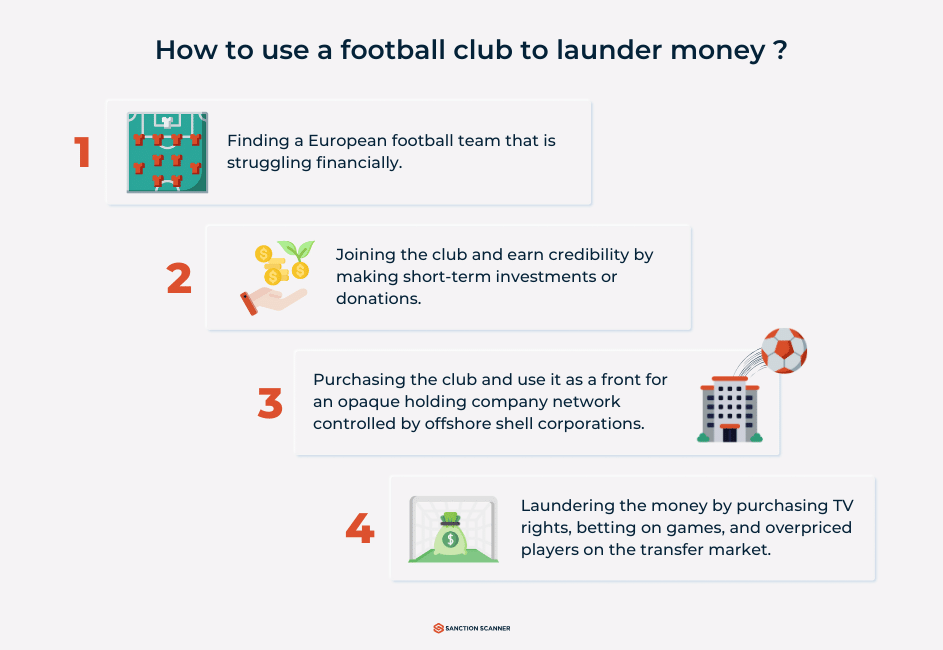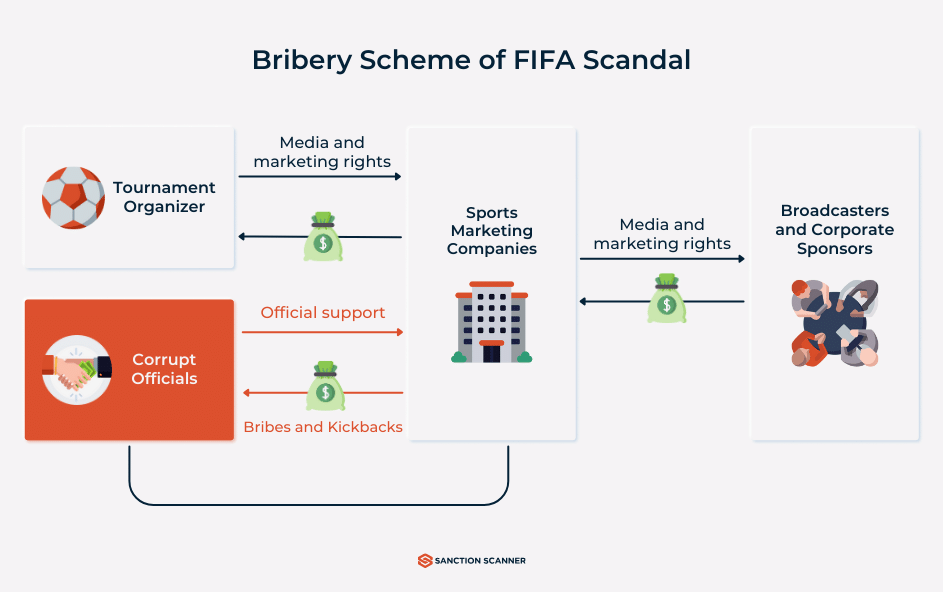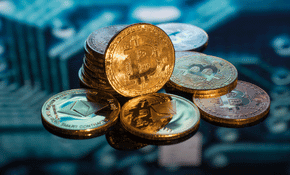Thanks to its endless popularity, football has transformed into a global economic powerhouse, channeling vast sums of money through player transfers, sponsorships, and broadcasting deals. However, where there is a flow of money, the potential for illicit activities is present. Numerous individuals and entities have cleverly harnessed the extensive financial framework of the sport to legitimize their unlawful gains, turning illegal money indistinguishable from legally acquired assets.
How to Launder Money Through Football?
Money laundering in football involves intricate techniques to hide the source of illicitly obtained money. A typical approach is to manipulate player transfers. By inflating the price paid for a player during a transfer, criminals can make their illegal money seem legitimate. They sneak their dirty funds into the transfer, creating a seemingly lawful financial record. The extra money, paid beyond the player's actual worth, is then channeled back to the criminals via complex routes, effectively laundering the money while making it look like a proper football deal.
Sponsorship agreements also offer an undercover route for money laundering. Criminals might establish fake companies or intermediaries that appear as sponsors for football clubs or events. These fake sponsors then pour their dirty money into the legitimate football system, making it hard for authorities to track the money's source. These transactions blur the line between real sponsorship and money laundering, putting the sport at risk of financial deceit. Understanding these techniques is essential to protect the football sector’s reputation and integrity.

Why is Football Particularly Vulnerable to Money Laundering?
Football's vulnerability to money laundering and illicit financial activities is a pressing concern.
One of the notable frustrations is the lack of transparency surrounding the cases, such as tax evasion related to player signings and image rights, which leaves room for speculation. Furthermore, the risk of football clubs being taken over by individuals with dubious characters and financial backgrounds echoes the longstanding fears of fans. Football clubs' deep-rooted connection within local communities makes them particularly susceptible to exploitation, as they can become vehicles for money laundering.
Football's cherished status within local communities, coupled with its financial complexities, continues to make it a fertile ground for illicit financial activities, demanding vigilant oversight and action.
Fraudulent Connections of Football Clubs
Fraudulent connections extend to various aspects of football, including players, fans, club officials, and even external stakeholders. In many cases, the desire for personal gain, combined with the lack of robust anti-fraud controls has created an environment ripe for fraudulent activities.
Famous Football Money Laundering Scandals
The FIFA Scandal
In 2015, FIFA, the international football governing body, became embroiled in a corruption scandal following the indictment of several top FIFA executives by the US Department of Justice. This scandal eventually resulted in the downfall of two of football's most powerful figures, FIFA President Sepp Blatter and UEFA President Michel Platini, who were both handed eight-year bans from any football-related activities by FIFA's ethics committee.
Swiss law enforcement, acting on the request of the United States, conducted a high-profile raid at a luxurious hotel in Zurich, leading to the apprehension of seven FIFA executives. This operation marked the culmination of a thorough FBI inquiry that had been scrutinizing FIFA's dealings for three years. Later in December of the same year, an additional 16 officials faced charges. These charges included various forms of fraudulent activities, including allegations of bribes and money laundering amounting to well over $200 million.
The FIFA scandal had profound consequences for the organization responsible for overseeing international football. It raised significant doubts about the transparency and honesty of FIFA's operations, including the process of awarding World Cup tournaments, electing its president, and managing finances, particularly those allocated for improving football infrastructure in less privileged member nations. Ultimately, the scandal triggered a major leadership transition within FIFA, prompting essential discussions on the necessity of reform and openness in the global football community.

Brazil
In 2015, Brazilian football, known for its passion and flamboyance, was dealing with allegations of corruption and money laundering. The scandal implicated high-ranking executives and officials in embezzlement and money laundering activities. The incident sent shockwaves through the Brazilian football community and raised questions about the financial transparency of the sport in the nation.
Portugal
Corruption has also infiltrated Portuguese football, with alarming consequences. Recent investigations by public prosecutors targeted premises linked to FC Porto and its CEO, Jorge Nuno Pinto da Costa, uncovering a web of financial misconduct, including a €9 million payment to agents as part of a €50 million player transfer to Real Madrid in 2019. Pinto da Costa, previously involved in the "Golden Whistle" scandal, faced scrutiny for allegedly corrupting match referees.
Russia
During Operation Matrioskas, the Portuguese Police, with the support of Europol, successfully dismantled a transnational criminal group primarily comprising Russian citizens, engaged in money laundering within the football sector. Operating since at least 2008, this network was believed to be an offshoot of a significant Russian mafia organization, responsible for laundering millions of euros across various EU countries, with the funds largely originating from criminal activities conducted outside the EU. The group's aim involved targeting financially distressed European football clubs, infiltrating them with benefactors who would provide short-term donations or investments to gain trust, and eventually orchestrating the club's purchase.
Once under Russian mafia control, the clubs were exploited for money laundering purposes, utilizing financial transactions, cross-border money flows, and governance deficiencies to clean illicit funds, often through player transfer valuations and television rights deals, and to facilitate betting activities.
Operation Matrioskas led to the arrest of three key individuals, the search of 22 residences and companies, including four major football clubs, and the seizure of significant amounts of cash. Europol's involvement and expertise were pivotal in this complex international investigation, which revealed connections to various serious and organized crimes across Europe.
Initiative Against Football Money Laundering
The initiative against money laundering in football is gaining importance thanks to the collaborative efforts of governments, football federations, and modern anti-money laundering (AML) compliance solutions. National football associations are taking active steps to combat fraud and money laundering. They work closely with law enforcement to scrutinize suspicious transactions, enforce stringent financial rules, and keep a close eye on player transfers. Furthermore, they emphasize transparency, conduct regular financial checks, and educate everyone involved about the dangers of financial wrongdoing to ensure the game's integrity.
Regulations imposed by government authorities and football governing bodies play a critical role in protecting the sport's financial transactions from being exploited by criminal entities. These rules are aimed at thwarting the schemes of corrupt individuals and criminal organizations looking to misuse the football sector for their illicit financial activities. Responding to these evolving regulations, AML compliance solutions, including innovative software, have been produced as effective tools to help football entities maintain transparency and adhere to established standards.
Government regulations, marked by stringent financial reporting requirements and effective due diligence procedures, act as strong defendants against money laundering in football. Governments hold clubs and individuals in the sport accountable for adhering to AML regulations by imposing legal obligations and penalties for non-compliance. Football federations also assume a pivotal role by setting industry-specific standards that underscore the significance of transparent financial transactions. These regulations not only shield the sport's reputation but also ensure fair competition and financial stability for football clubs.
In this joint campaign to combat football-related money laundering, AML compliance solutions, particularly software, have become invaluable tools. These innovative solutions allow football clubs to automate AML verifications, track financial transactions, and confirm adherence to stringent regulations. AML software aids in suspicious activity reporting, effectively blocking the flow of illicit funds into the sport. Consequently, when government and football federation regulations align with advanced AML compliance solutions, a robust defense against money laundering is established, securing the future of the sport.
Sanction Scanner's Transaction Screening Tool
Sanction Scanner is at the forefront of developing Anti-Money Laundering (AML) compliance software, and its Transaction Screening Tool is a standout solution for combating money laundering in the football industry. This tool provides a powerful defense by swiftly identifying potential risks within financial transactions, ensuring adherence to global AML regulations. With its intuitive interface and real-time monitoring, Sanction Scanner's Transaction Screening Tool seamlessly integrates into football clubs' daily operations, offering an effective means to protect against money laundering and uphold the financial integrity of the sport. To get more information, contact us or request a demo today.







